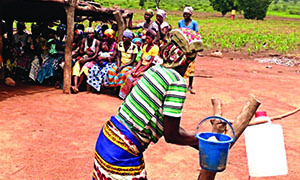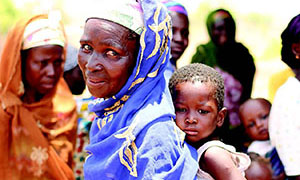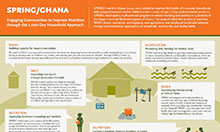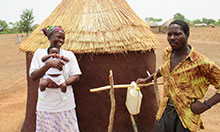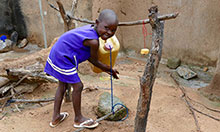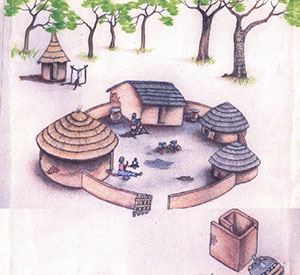
In Ghana, the SPRING 1,000 day household approach targets nutrition improvements to pregnant women and children 2 years of age and younger, paving a clear impact pathway for each activity. Our work supports the expansion of proven nutrition-specific and nutrition-sensitive interventions in 15 districts of northern Ghana, including interventions in health, WASH (water, sanitation, and hygiene), social protection, and agriculture. By analyzing how each intervention area impacts the ability of the 1,000 day household to care and support the 1,000 day child, we ensure that investments are prioritized and adapted appropriately. By applying SPRING quality improvement (QI) standards, we aim to develop an enabling environment within each household, which will foster more supportive communities and a broader understanding of the importance of the first 1,000 days.
Potential Criteria for “1,000 Day-Friendly Communities”
- Traditional leaders who are able to clearly articulate the importance of the first 1,000 days and are supportive of all related community interventions
- WASH activities that include safe water for children under two, a clean play space for children under two that minimizes exposure to animal feces, handwashing at key times, and safe disposal of child and adult feces
- High level of attendance at antenatal care visits and growth monitoring activities
- Awareness of the role aflatoxin plays in limiting nutrition and good practices for aflatoxin management
- Evidence of active father-to-father and mother-to-mother groups that are supported in the community
- Evident linkages and engagement between the formal health sector and community QI committees
We adapt each focus area to better support the 1,000 day child. For example, community-led total sanitation (CLTS), a governmental priority that SPRING is supporting, has been modified with additional actions that impact the 1,000 days child. These include specific use of handwashing facilities at the household level and clean play spaces for children under two to prohibit the ingestion of animal feces. Although CLTS implementation involves the whole community, SPRING’s emphasis is on promoting improved sanitation and hygiene behaviors specifically in 1,000 day households.
SPRING’s work to strengthen nutritional outcomes through agricultural programming also prioritizes activities that will impact 1,000 day households. These include improving the processes for the production and storage of groundnuts, and educating families about the harmful effects of aflatoxin through our Farmer Field Schools. We also promote the cultivation and consumption of orange-fleshed sweet potatoes (which is rich in Vitamin A), especially for its inclusion as a complementary food for infant and young child feeding (IYCF). These measures will ensure that agricultural investments directly impact the 1,000 day window. All interventions are supported by a multi-sectoral social and behavior change communication (SBCC) agenda highlighting the 1,000 days approach through radio, video, and interpersonal communication.
| Key 1,000 Day Household Behaviors Targeted | |
|---|---|
| Service Delivery | Critical Behavior to Improve |
| IYCF | Early initiation of breastfeeding (BF) |
| Exclusive BF through 6 months | |
| Continued BF for 2 years | |
| Timely, appropriate complementary feeding, “colored food” | |
| Anemia | Iron-folic acid (IFA) compliance among pregnant women |
| IFA compliance among adolescent girls | |
| Community-Based Management of Acute Malnutrition | Timely appropriate care for severe acute malnutrition (with and without complications) |
| Timely appropriate care for moderately malnourished children | |
| Environmental Enteropathy | Handwashing at appropriate times, including before preparation of complimentary foods and feeding, and after latrine |
| Safe disposal of human and animal feces | |
| Clean play space for children | |
| Use of improved water (including home treatment) | |
| Improved ground nut production storage and handling to reduce aflatoxin and other mycotoxin consumption (food safety) | |
| Social Protection | Use of cash transfers among vulnerable 1,000 day households to smooth cash availability during lean season |
Download and print this information. (PDF, 345 KB)
